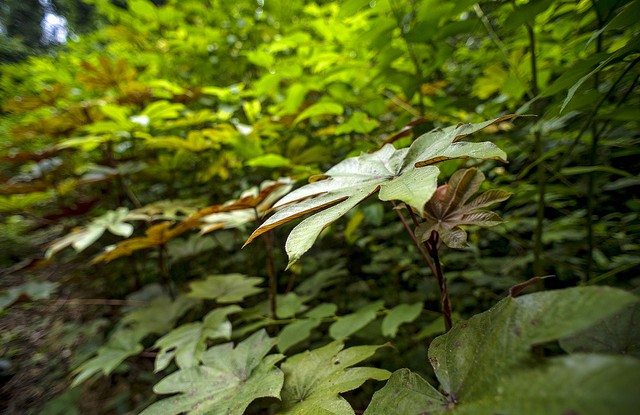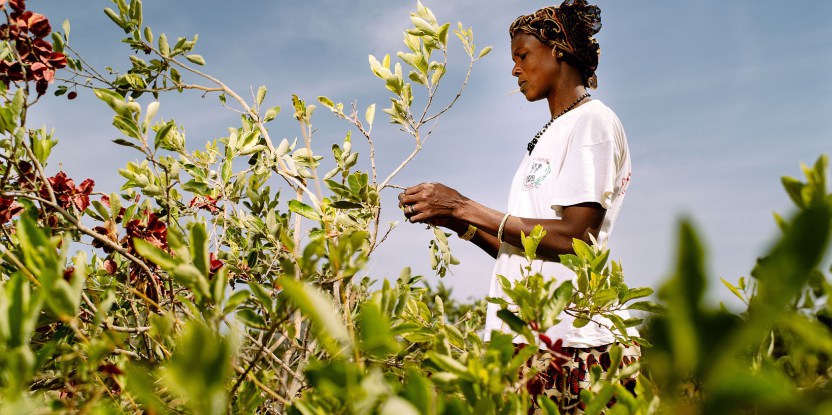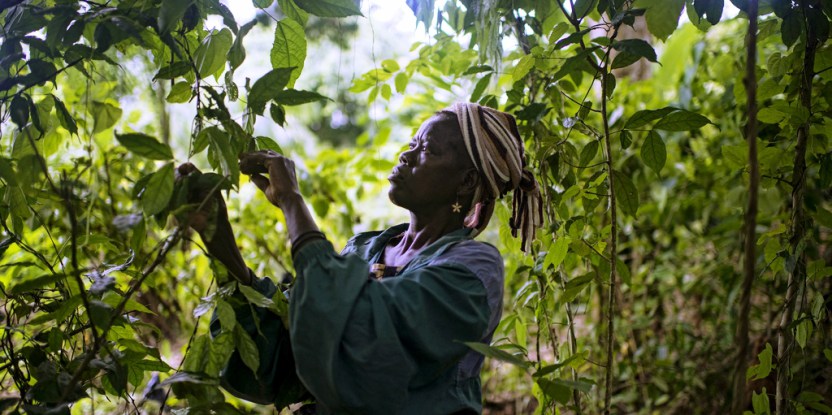
An assessment of large-scale agriculture in Cameroon has shown that land benefit-sharing reforms could help develop a REDD+ (Reducing Emissions from Deforestation and forest Degradation) revenue-payment mechanism, clarify the legal basis of land management in the country and help combat rural poverty.
Amid growing demand for farmland and mining permits, scientists with the Center for International Forestry Research (CIFOR) set out to assess the mechanism governing land-rent fees in Cameroon’s agro-industry.
The results of the study, which have been presented to parliamentarians, raise hopes that revised legislation could pave the way for successful implementation of REDD+.
“A month before the paper was published, I was invited to present the results before a parliamentary committee,” said Samuel Assembe Mvondo, the study’s principal author and a scientist with CIFOR’s regional office in Cameroon. “The results were a big surprise for many of them. Some were not aware of the problem with land fees.”
The study, Assessment of the effectiveness, efficiency and equity of benefit-sharing schemes under large-scale agriculture: Lessons from land fees in Cameroon, appeared in the European Journal of Development Research.
With few exceptions, the study found that schemes for agro-industry to compensate landowners in 40 villages throughout Cameroon were ineffective, inefficient and inequitable.
“Although land-fee laws were put in place in the mid-1970s, there has never been a study or evaluation of how well they work,” Assembe Mvondo said. “Since current governance in Cameroon is known to be poor, I’m not surprised by the results of the study. Hopefully, politicians will take into account our recommendations when they revisit the land laws.”
INEFFECTIVE, INEFFICIENT, INEQUITABLE
Researchers selected five subsidiaries of multinationals operating in Cameroon’s agro-industrial sector to assess mechanisms for the payment of land fees. The five, kept anonymous for legal reasons, operate in the oil palm, rubber, banana and sugarcane sectors.
Only two corporations had operations on “national” lands — that is, land that was not already privately or publicly owned — and were thus required to pay land fees to councils and communities. The oil palm corporation, a French subsidiary, operates five plantations in six councils over three regions (provinces) covering more than 78,000 hectares (ha). The sugarcane company, also part of a French multinational, produces more than 140,000 tons of sugar annually.
Other researchers have shown that where local people have lost their customary land to agro-industrial plantations, there will be — sooner or later — protests and violent conflicts between the oppressed locals and the state-company
The study found the land-fee mechanism was ineffective. While communities near the sugarcane plantation receive their share of land rents, those near the five oil palm plantations do not. Citing SHERPA, a civil society organization, the researchers linked the lack of payments to the poor living conditions of employees and local communities residing near the oil palm plantation.
Why doesn’t the mechanism work consistently?
In an interview with researchers, a ministry official suggested public employees in charge of collecting revenue were embezzling funds. Indeed, around 30 million euros ($41 million) were misappropriated in 2011 in collusion with land administration officials, according to the study, which cited Cameroon’s National Anticorruption Commission (CONAC).
The study found also inconsistent levels of efficiency. Whereas the sugarcane company uses a decentralized system that puts cheques directly into the hands of beneficiaries, the oil palm company pays royalties into a centralized tax fund 300 kilometers away in the capital, Yaoundé. Transaction costs are high and risky, the study says, which creates inefficiency and also partly explains why communities do not receive payments.
Researchers also explored two issues related to equity.
On the one hand, while communities around the sugarcane plantation may receive payments, their legal share of 20 percent is half of what the state and local councils receive. Consequently, the study suggests, the system has a built-in bias against local communities
On the other, councils use land rents to meet current needs such as paying salaries rather than for investing in sustainable development. In some villages, land rents have not produced any significant improvement in living conditions. Even councils that do invest in community projects have not reduced poverty at the household level.
“Revenue from land fees is not used differently than forest royalties,” Assembe Mvondo said. “It is not meaningfully invested in health, electricity, water or education.”
RISK OF CONFLICT
According to researchers, the case of the oil palm company clearly shows the current model of land rent is porous, incomplete and unfair. It favors the relationship between the state and economic operators to the detriment of councils, particularly local communities near the plantations.
“Other researchers have shown that where local people have lost their customary land to agro-industrial plantations, there will be — sooner or later — protests and violent conflicts between the oppressed locals and the state-company,” Assembe Mvondo said.
Indeed, civil society has already launched protests against the planned expansion of an American oil palm company. Meanwhile, Assembe Mvondo says, some protests against the rubber company operating on public lands (and thus not legally required to compensate communities) have been violent, and one leader has been arrested.
For a follow-up study, Assembe Mvondo is tracing the evolution of corporate governance in the rubber company to determine how different owners address issues of corporate social responsibility.
LAYING A FOUNDATION FOR REDD+
The researchers recommend several ways to improve benefit-sharing of rents on national lands, pointing out these enhancements are also preconditions for any future REDD+ program in Cameroon.
Recommendations include carrying out a systematic inventory of national lands occupied or granted/leased, ensuring all operators pay land rents as required by law, launching competitive bids for national lands open to investment and ensuring all information related to occupation/use of national lands is published.
Through the Forest Carbon Partnership Facility, the World Bank has approved Cameroon’s Readiness Preparation Proposal for REDD+, Assembe Mvondo said. The country is now starting to elaborate a national strategy, and some pilot projects are already operating in the field.
“I think it’s important for the designers of the benefit-sharing mechanism for REDD+ in Cameroon to learn how the Constitution has set up land rents for communities,” he said. “In this way, they can avoid the mistakes of the past, and ensure the mechanism is effective, efficient and equitable.”
For more information about the issues in this article, contact Samuel Assembe Mvondo, s.assembe@cgiar.org.
This research forms part of the CGIAR Research Program on Forests, Trees and Agroforestry and was supported in part by NORAD, AusAID, DFID and the European Commission.
We want you to share Forests News content, which is licensed under Creative Commons Attribution-NonCommercial-ShareAlike 4.0 International (CC BY-NC-SA 4.0). This means you are free to redistribute our material for non-commercial purposes. All we ask is that you give Forests News appropriate credit and link to the original Forests News content, indicate if changes were made, and distribute your contributions under the same Creative Commons license. You must notify Forests News if you repost, reprint or reuse our materials by contacting forestsnews@cifor-icraf.org.

